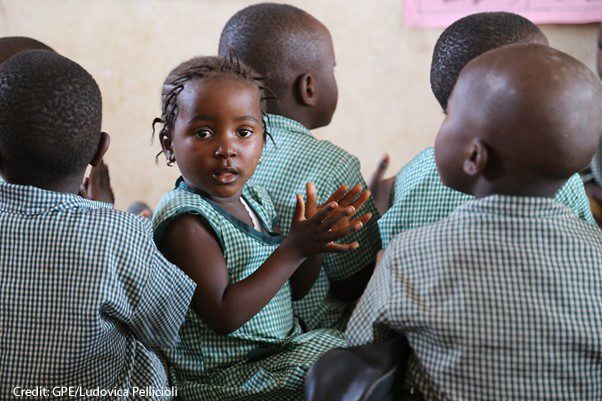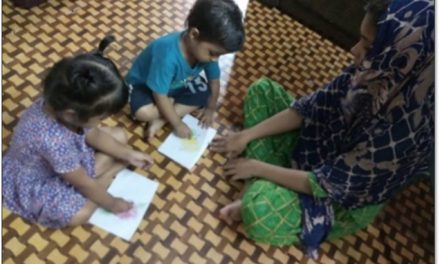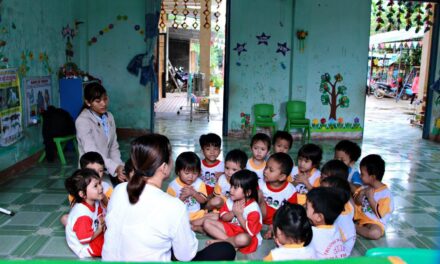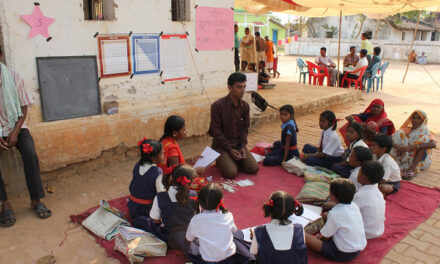This blog was written by Professor Pauline Rose and Dr Asma Zubairi, Research for Equitable Access and Learning (REAL) Centre at the University of Cambridge.
The first five years of a child’s life are among the most critical for their long-term development. This has now become recognised in the introduction of the Sustainable Development Goals, which includes an explicit focus on ensuring that ‘all girls and boys have access to quality early childhood development, care and pre-primary education so that they are ready for primary education’ by 2030.
Yet aid spending on pre-primary schooling has remained abysmally low. In the light of this, Theirworld, a global children’s charity committed to ending the global education crisis and unleashing the potential of the next generation, has been campaigning for 10 per cent of education aid budgets to be spent on pre-primary education. As we show in this blog, we are still a long way from seeing this as a reality, although there are steps in the right direction in terms of a global recognition of the need for setting this target.
Since 2017, the Research for Equitable Access and Learning (REAL) Centre at the University of Cambridge, has been collaborating with Theirworld to inform their advocacy through tracking progress on donor spending on pre-primary education annually. Our analysis shows that a chronic lack of funding from global leaders is leaving marginalised young children at risk of falling even further behind.
Our first analysis in 2017, showed that pre-primary education had not achieved the level of priority necessary in domestic policies and budgets, with nearly all low-income countries dedicating less than 5 per cent of their domestic education budgets to pre-primary education. Moreover, the international community had not kept pace to incentivise governments to invest in pre-primary education – less than 1 per cent of aid was dedicated to pre-primary education.
In September 2017, UNICEF published Early Moments Matter for Every Child. In this flagship report on early childhood development, UNICEF called for governments and partners to ‘Invest urgently in services that give young children, especially the most deprived, the best start in life.’ This UNICEF report references our first 2017 REAL Centre report for Theirworld, where we recommended that ‘National governments should increase the overall share of national resources for education and begin reorienting their education budgets to ensure two years of free pre-primary, with funding in place by 2020 to allocate at least 10% of their education budget to this sector.’ The UNICEF report reiterated this 10 per cent target for national education budgets.
The fact that this target has now become known as ‘the UNICEF recommendation’ is a positive step in itself, providing all member states with a joint goal to work towards – and ideally beyond. Momentum has been building over the past six years and our annual reports analysing pre-primary spending show this. Yet progress remains far too slow.
In our progress reports from 2018 to 2021, we continued to find that donors spend less than 1 per cent of education budgets on pre-primary education. And in our 2021 report, we also found that, of the world’s top 30 donors to education, 8 did not spend a single cent on pre-primary education.
Our 2019 report found that children living in the most vulnerable and conflict-affected contexts were often those who received less than their fair share of pre-primary education aid. In that same year, Education Cannot Wait announced its intention to triple its investments to early childhood education, and so meet the 10 per cent target. In our 2021 report, we found that Education Cannot Wait was close to the target, and the Global Partnership for Education and UNICEF had reached it. This shows that achieving the target is possible.
Our latest report in 2022, warns of a continued chronic lack of funding by global leaders. While there was a slight increase in the priority to pre-primary education by some funders, the sector still receives just 1.2 per cent of the global education aid budget.
In recognition of the exposure our reports have given to this chronic underfunding, at the September 2022 United Nations General Assembly, the Special Rapporteur on the right to education, Koumbou Boly Barry, affirmed: ‘UNICEF has called upon States to spend 10 per cent of national education budgets on pre-primary education and upon donors to allocate 10 per cent of aid to it. Noting that such funding is predominantly aimed at pre-primary education, additional funding will be needed to address the broader aspects of ECCE, in particular those related to health care and social protections.’
Subsequent to this, representatives of about 150 UNESCO member state countries, as well as experts from all over the world, gathered in Tashkent, Uzbekistan, in November 2022 for the World Conference on Early Childhood Care and Education (ECCE). The event aimed to reaffirm the right of every young child to quality ECCE from birth to 8 years of age, strengthen political commitment and action, and rally countries to develop rights-based and inclusive ECCE policies and programmes.
The conference acknowledged the relative neglect of ECCE in many national and international policy agendas on education, and the inadequate progress made in achieving commitments towards the Sustainable Development Goal 4 target focused on early childhood development, and pre-primary education specifically.
In the Declaration and Commitments to Action for Transforming Early Childhood Care and Education, one of the commitments (Section VI) from member states was to: “Recall the commitments in the Incheon and Paris Declarations to public funding in education, increase financing for ECCE to a level sufficient to achieve SDG Target 4.2, in particular, working towards the allocation of at least 10 per cent of education expenditures to pre-primary education, and prioritize and reorient public expenditures for ECCE to focus on the poorest and most disadvantaged.”
The Right To Education Initiative responded by welcoming the call for countries to increase pre-primary spending to at least 10 per cent, recognising that ‘the realisation of ECCE rights, including the right to at least one year of free pre-primary education, will only be possible with adequate funding’.
We are reassured that the REAL Centre and Theirworld ongoing monitoring and advocacy has come to fruition in terms of a wider recognition of, and indeed a global commitment to, this 10 per cent spending target for pre-primary education in the Tashkent Declaration. Now we need to see this put into action!





